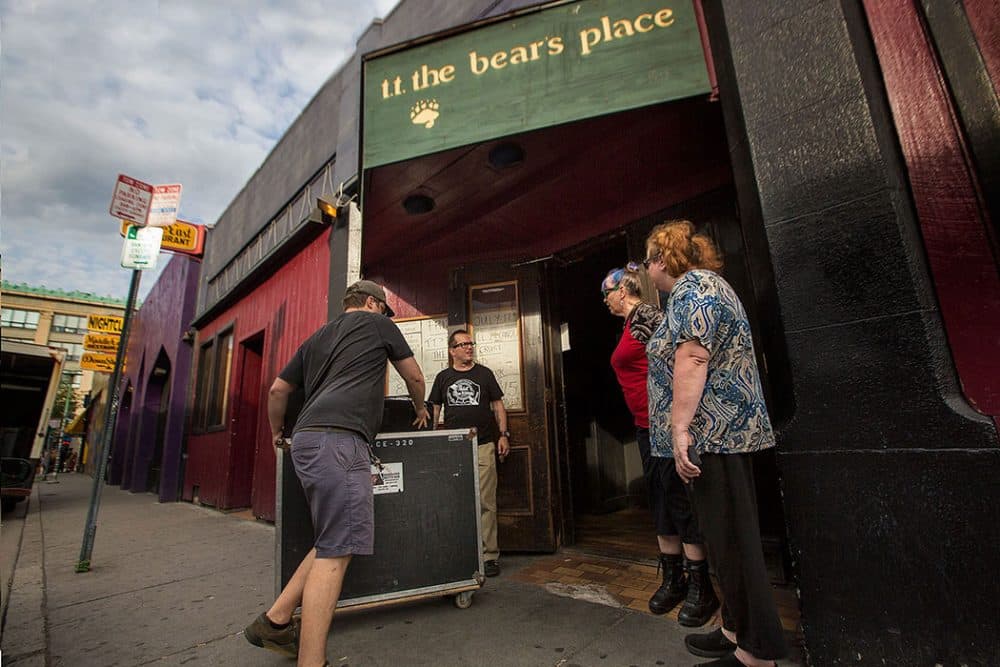Advertisement
What Does The End Of TT The Bear's And Johnny D's Mean For Boston's Music Scene?

For the past 40 years, T.T. the Bear's Place has been a staple in the local music scene — an intimate concert space that has hosted up-and-coming bands and big acts for decades. Saturday, the Central Square institution will close. The owners couldn't come to a new lease deal with the building's owners.
And, in Somerville's Davis Square, the owner of Johnny D's music club announced that, next year, it, too, will shutter after almost five decades as part of the Boston arts scene. So, what does it mean to the local music scene to lose these two fixtures?
Guest
Peter Wolf, singer/songwriter and former front man of the J. Geils Band.
Mark Ferranti, bass player for Bim Skala Bim, which tweets @bimskalabim.
Boston Musicians Lament The Loss Of T.T.'s & Johnny D's:
Peter Wolf: "It really hurts all musicians and all fans when an independent club...like that closes. It limits the amount of opportunities to get to see bands, the opportunities for bands to play and it's happening more frequently as real estate prices rise...It just sort of makes it like a funnel where...a lot of people want to come in [and there's no room.] It's sort of almost like traffic at an airport...Everyone loses."
Mark Ferranti: "It is actually a tragedy, really...T.T.'s especially was a place where...a brand new band who's probably not done that many gigs in front of anybody could, you know, get a gig actually opening for like a national act or something. You know, being an independently-run club like that, they had flexibility to...do whatever they want and there was no pressure on them from any external sources. So they could be accessible to the local musicians...The stage is only a couple feet high, so, you get that immediate feedback from the crowd."
MF: "There were a lot more clubs back then, but T.T.'s was sort of special in that it kind of had like a real stage and lights and a real PA system...There were a lot of places to play, but T.T.'s was like sort of a rock, kind of...Every band I've either known to be either actually played in or associated with, they all got gigs at T.T.'s. It was sort of like, you know, you'd play there at least one or two times a year. It was one of the more reliable clubs, and it being in the heart of Central Square, it was really where you wanted to be."
PW: "[When J. Geils] started, there was a curse on Boston called the Boston music scene and the Bosstown sound...There [were] so many bands coming out of California — Janice Joplin, Jefferson Airplane, Grateful Dead, so they created this thing called Bosstown sound in Billboard magazine and...it became a joke of the industry. 'Oh, are you from Bosstown?' So, it took a while, you didn't even want to say you were from Boston. So, when we started touring throughout the country, it was hard to break that [stigma] and, slowly, Boston started building up a really great reputation through the years in clubs...Many of the bands coming from Europe, the English bands...like Led Zeppelin, The Who, all got their starts in Boston. That's where they first stopped before moving on down to New York. So, the scene in Boston started to change...[But] once you lose that intimate club — for instance, there was a club called The Jazz Workshop, and I got to see, in that club, Bob Marley, Miles Davis, Van Morrison, Willy DeVille, Mose Allison. I mean, some really iconic artists."
PW: "Boston has...very vibrant college radio, which is very important, and it's very supportive of a lot of new artists and the local artists...Plus, you have so many colleges which means there's so many students that want to go out and see the bands that they enjoy, so there is a healthy environment for bands from Boston or bands from out of town to come to this area. And there's still some great clubs left."
More
The ARTery: 'I Really Liked To Take Chances' — An Oral History Of T.T. The Bear's
- "On June 20, the storied Cambridge rock club T.T. the Bear’s Place hosted an 'everything’s gotta go' sale, a flea market designed to clear the venue of all its accumulated detritus before it shuttered on July 25. Out went the rickety furniture and the grimy ashtrays and the decorative foam gargoyles. For weeks afterward, the still-operating club felt eerily airy, though it hadn’t been stripped barren, not yet. An overhead light in the entryway, ensconced in a glowing red artist’s rendering of a human heart, still pumped away determinedly against the encroaching darkness."
The ARTery: Johnny D’s, Longtime Davis Square Music Club, To Close
- "The closure of Johnny D’s, located at 17 Holland St., is the second big change for the Greater Boston music scene in recent months. In May, T.T. the Bear’s Place, in Cambridge, announced its closure. 'It seems like the music scene in Boston is on life support,' Jim Morey, 32, of Dorchester said, adding he’s recently been upset about T.T.’s impending closure."
This segment aired on July 22, 2015.